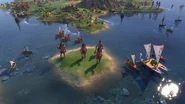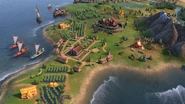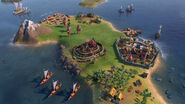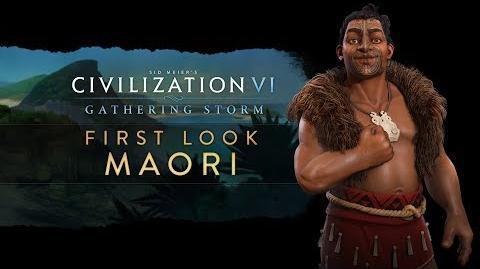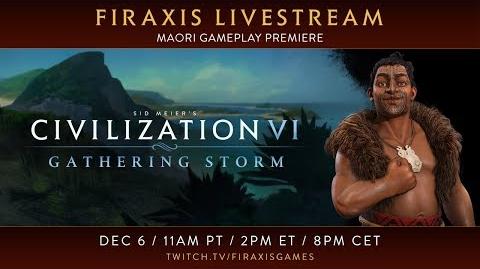Tag: Visual edit |
Tag: Visual edit |
||
| Line 33: | Line 33: | ||
This ability also has one implication: everyone on the map (including you) will have less space for expansion. This is how map generation of the game works: when the game is set up, the map will be divided into areas equal to the number of civilizations in the game. However, when Māori is in the game, since you do not start on land, map generation will not take this into account, meaning you will have to settle closely to at least another civilization. It also means empires away from you will have relatively more breathing room, including resource access and expansion space. There are two ways you can address this issue, depending on the situations: |
This ability also has one implication: everyone on the map (including you) will have less space for expansion. This is how map generation of the game works: when the game is set up, the map will be divided into areas equal to the number of civilizations in the game. However, when Māori is in the game, since you do not start on land, map generation will not take this into account, meaning you will have to settle closely to at least another civilization. It also means empires away from you will have relatively more breathing room, including resource access and expansion space. There are two ways you can address this issue, depending on the situations: |
||
| − | * You can quickly beeline for [[Construction (Civ6)|Construction]] to unlock the Toa, your very powerful unique unit. An army of Toas can make quick work of your next door neighbors and [[City-state (Civ6)|City-states]]. This strategy is advised when there are a lot of naval powerhouse civilizations present in the game ([[Indonesian (Civ6)|Indonesia]], [[Norway (Civ6)|Norway]], [[Phoenician (Civ6)|Phoenicia]], [[Netherlands (Civ6)|Netherlands]], [[England (Civ6)|England]], [[Brazilian (Civ6)|Brazil]] |
+ | * You can quickly beeline for [[Construction (Civ6)|Construction]] to unlock the Toa, your very powerful unique unit. An army of Toas can make quick work of your next door neighbors and [[City-state (Civ6)|City-states]]. This strategy is advised when there are a lot of naval powerhouse civilizations present in the game (early game naval empires like [[Indonesian (Civ6)|Indonesia]], [[Norway (Civ6)|Norway]], and [[Phoenician (Civ6)|Phoenicia]] are especially dangerous, and to a lesser extent, late game naval civilizations like [[Netherlands (Civ6)|Netherlands]], [[England (Civ6)|England]], and [[Brazilian (Civ6)|Brazil]]), as you will need your empire consolidated to be easily defended against invasions, instead of spreading it out multiple landmasses which are distant from one another. Also, you would have enough space for yourself that you do not need to worry too much about other empires, as they will still have to contest against one another while you can have an entire corner of the map to yourself. |
* Spread your cities out multiple landmasses across the globe. By doing this, you ensure there is no civilization that can get extra breathing room, a good measure to keep everyone in check. This is great when there is no major naval powers, as their Settlers and military units can only embark with [[Shipbuilding (Civ6)|Shipbuilding]] and cross deep oceans with [[Cartography (Civ6)|Cartography]], when you can do all of that since the beginning of the game. By the time your opponents unlock these key technologies, your cities would have enough time to develop and they can put together an army on their own in case of war. This is very dangerous, however, if there are the naval civilizations that are mentioned above, since, remember, you are a maritime empire that is good at exploring, but not one specializing in naval warfare. Your unique unit is strong but it is a land unit, and you are helpless against naval invasions if your preparation is poor. By spreading your colonies across the globe, military mobilization is much more difficult, and all of your newly settled cities that are far from your core territory can go in one fell swoop. |
* Spread your cities out multiple landmasses across the globe. By doing this, you ensure there is no civilization that can get extra breathing room, a good measure to keep everyone in check. This is great when there is no major naval powers, as their Settlers and military units can only embark with [[Shipbuilding (Civ6)|Shipbuilding]] and cross deep oceans with [[Cartography (Civ6)|Cartography]], when you can do all of that since the beginning of the game. By the time your opponents unlock these key technologies, your cities would have enough time to develop and they can put together an army on their own in case of war. This is very dangerous, however, if there are the naval civilizations that are mentioned above, since, remember, you are a maritime empire that is good at exploring, but not one specializing in naval warfare. Your unique unit is strong but it is a land unit, and you are helpless against naval invasions if your preparation is poor. By spreading your colonies across the globe, military mobilization is much more difficult, and all of your newly settled cities that are far from your core territory can go in one fell swoop. |
||
As you can imagine, for the Māori, exploration is the key to a lot of important decision. Exploit the fact that you can wrest complete control of the seas in the first few eras and decide for yourself which option is best for your empire. |
As you can imagine, for the Māori, exploration is the key to a lot of important decision. Exploit the fact that you can wrest complete control of the seas in the first few eras and decide for yourself which option is best for your empire. |
||
Revision as of 03:53, 16 October 2019
The Māori people represent a civilization in Civilization VI: Gathering Storm. Their colors are red and sky blue, and they are led by Kupe.
The Māoris' civilization ability is Mana, which allows them to begin the game with the Sailing and Shipbuilding technologies and the ability to enter Ocean tiles, and provides their embarked units with +5 ![]() Combat Strength and +2
Combat Strength and +2 ![]() Movement Movement. Unimproved Woods and Rainforests in their territory provide extra
Movement Movement. Unimproved Woods and Rainforests in their territory provide extra ![]() Production (+1 initially, with additional bonuses after discovering Mercantilism and Conservation), and Fishing Boats provide +1
Production (+1 initially, with additional bonuses after discovering Mercantilism and Conservation), and Fishing Boats provide +1 ![]() Food and trigger a Culture Bomb; however, they cannot harvest resources or earn
Food and trigger a Culture Bomb; however, they cannot harvest resources or earn ![]() Great Writers. Their unique unit is the Toa (which replaces the Swordsman), and their unique building is the Marae (which replaces the Amphitheater).
Great Writers. Their unique unit is the Toa (which replaces the Swordsman), and their unique building is the Marae (which replaces the Amphitheater).
Strategy
In every reiteration of Civilizations, there is always one civilization whose gameplay is so unique that it deserves a category of its own. If Venice takes the cake in Civilization V, the spotlight is definitely on the Māori this time around. Playing as the Māori under Kupe, you will embark on an adventure finding the promise land for your people, and from there you will build up an empire with an inexorable culture.
Kupe's Voyage
Initially, your Settler and Warrior will start their journey in the middle of the Ocean with no land tiles in sight. From here, you have to main choices, either separate the two units so you can find land earlier, or keep them together to escort one another. When contemplating these two options, the latter seems to have its advantages outweigh the disadvantages, as you need your Warrior to protect your Settler against Barbarians, otherwise it would quickly be a gameover. Furthermore, if your Warrior is the first unit to see land, it does not make any difference, since it is the Settler's job to create the first city anyway, so remember: keep them together.
Even when at sea, you already start generating 2 ![]() Culture and 2
Culture and 2 ![]() Science per turn, meaning you will have a slight disadvantage in
Science per turn, meaning you will have a slight disadvantage in ![]() Science and an advantage in
Science and an advantage in ![]() Culture compared to a normal civilization who settles their first city right away. The main effect of this is that you will unlock Code of Laws than most other civilizations (except for Trajan's Rome), allowing earlier access to the starting policy cards. Also, it is advised to not choose which starting technology to research until you find the land you want to settle your
Culture compared to a normal civilization who settles their first city right away. The main effect of this is that you will unlock Code of Laws than most other civilizations (except for Trajan's Rome), allowing earlier access to the starting policy cards. Also, it is advised to not choose which starting technology to research until you find the land you want to settle your ![]() Capital Capital, as the
Capital Capital, as the ![]() Science will accumulate until you choose instead of being wasted. By doing this, you can customize your choice to fit the surrounding of your
Science will accumulate until you choose instead of being wasted. By doing this, you can customize your choice to fit the surrounding of your ![]() Capital Capital. The ideal place for your
Capital Capital. The ideal place for your ![]() Capital Capital should have at least two ocean resources with plenty of passable terrain features (Woods, Rainforest, Marsh, Reefs, Natural Wonders, etc.)
Capital Capital should have at least two ocean resources with plenty of passable terrain features (Woods, Rainforest, Marsh, Reefs, Natural Wonders, etc.)
Once you settle the first city, you will receive a free Builder, free ![]() Population, and the Palace with extra
Population, and the Palace with extra ![]() Housing Housing and
Housing Housing and ![]() Amenity Amenity to make up for the lost time on the oceans. The starting Builder should start building Fishing Boats on the ocean resources, which will trigger a Culture Bomb (from the Mana ability). The reason you should have at least two available resources is to trigger the Eureka for Celestial Navigation, the technology that unlocks Harbor, a crucial piece of infrastructure. The fact that you start with 2
Amenity Amenity to make up for the lost time on the oceans. The starting Builder should start building Fishing Boats on the ocean resources, which will trigger a Culture Bomb (from the Mana ability). The reason you should have at least two available resources is to trigger the Eureka for Celestial Navigation, the technology that unlocks Harbor, a crucial piece of infrastructure. The fact that you start with 2 ![]() Population means you can immediately start working on a new Settler, but this is not advised. It is better to train another scouting unit, since you can cross deep water from the beginning (This extra unit should be a Warrior on water-dominated maps or a Scout on maps with more land).
Population means you can immediately start working on a new Settler, but this is not advised. It is better to train another scouting unit, since you can cross deep water from the beginning (This extra unit should be a Warrior on water-dominated maps or a Scout on maps with more land).
This ability also has one implication: everyone on the map (including you) will have less space for expansion. This is how map generation of the game works: when the game is set up, the map will be divided into areas equal to the number of civilizations in the game. However, when Māori is in the game, since you do not start on land, map generation will not take this into account, meaning you will have to settle closely to at least another civilization. It also means empires away from you will have relatively more breathing room, including resource access and expansion space. There are two ways you can address this issue, depending on the situations:
- You can quickly beeline for Construction to unlock the Toa, your very powerful unique unit. An army of Toas can make quick work of your next door neighbors and City-states. This strategy is advised when there are a lot of naval powerhouse civilizations present in the game (early game naval empires like Indonesia, Norway, and Phoenicia are especially dangerous, and to a lesser extent, late game naval civilizations like Netherlands, England, and Brazil), as you will need your empire consolidated to be easily defended against invasions, instead of spreading it out multiple landmasses which are distant from one another. Also, you would have enough space for yourself that you do not need to worry too much about other empires, as they will still have to contest against one another while you can have an entire corner of the map to yourself.
- Spread your cities out multiple landmasses across the globe. By doing this, you ensure there is no civilization that can get extra breathing room, a good measure to keep everyone in check. This is great when there is no major naval powers, as their Settlers and military units can only embark with Shipbuilding and cross deep oceans with Cartography, when you can do all of that since the beginning of the game. By the time your opponents unlock these key technologies, your cities would have enough time to develop and they can put together an army on their own in case of war. This is very dangerous, however, if there are the naval civilizations that are mentioned above, since, remember, you are a maritime empire that is good at exploring, but not one specializing in naval warfare. Your unique unit is strong but it is a land unit, and you are helpless against naval invasions if your preparation is poor. By spreading your colonies across the globe, military mobilization is much more difficult, and all of your newly settled cities that are far from your core territory can go in one fell swoop.
As you can imagine, for the Māori, exploration is the key to a lot of important decision. Exploit the fact that you can wrest complete control of the seas in the first few eras and decide for yourself which option is best for your empire.
Mana
[WORK IN PROGRESS]
Civilopedia entry
Sometime during the 13th Century, people in canoes set off from somewhere in the Marquesas Islands in the South Pacific and headed south and west, until they arrived at the islands we call New Zealand, and which they called Aotearoa—"the land of the long white cloud". The group would have used the sophisticated, traditional Polynesian navigational techniques to find this land, inferring its existence from cues and clues reflected in the natural world. They would have come ashore to a place where human beings had never settled, which had torn away from the mainland 100 million years previously, which had a unique and precious biome formed by ages of geological separation. It was a land of innumerable species of birds, including immense and flightless giants, terrifyingly large raptors, and shy bush dwellers. There were few land mammals and a few ancient genera of reptiles. The seas around the island teemed with life.
The oldest known Maori sites are near Te Pokohiwi (Wairau Bar) on the South Island, where the Wairau River dumps into the strait between New Zealand's two main islands. The Maori's own account of their arrival says they are descended from the people of Hawaiki, and that the hero Maui dragged the islands of New Zealand up from the depths with his fishhook. They say the first settlements were by Kupe and Toitehuatahi. Indeed, one of the most important aspects of Maori culture is the recitation of lineage, whakapapa, by which the speaker situates themselves in their history, indeed back to the mythological past. Whakapapa has always been an important social system of the Maori, richly complex and laden with important cultural meaning.
For the next three hundred years or so, the Polynesian heritage of the Maori was shaped by the land they settled. Most groups, or hapu, were led by chieftains, who were imbued with mana—prestige and power—and who could repay friends with kindness and enemies with proportioned revenge. The Maori created beautiful objects from pounamu greenstone and the feathers of the islands' birds. Each hapu kept its own oral heritage alive, pointing back to the canoe-colonists from which they arrived at the island. The Maori perfected the haka, which is an energetic chant with strong, ritualized gestures and facial expressions, used to represent strength, courage, prowess, and respect. The distinctive Maori facial markings are called tā moko, and are unique to the person. For men, these cover the full face, and for women these are done on the lips and chin.
The first Europeans sighted New Zealand in 1642, but it wasn't until the 18th Century that regular contact between Europeans and the Maori began. The Maori referred to the Europeans as Pakeha, which is a term today which means “Non-Maori” more generally. The introduction of firearms and European diseases had a profound and negative effect on the Maori. Europeans began constructing permanent settlements, and in 1840 the British government drafted the Treaty of Waitangi, which was signed by many Maori chiefs.
The Treaty of Waitangi follows in the long tradition of unequal treaties between indigenous people and colonial governments, particularly with recognition of claims to the land. The western notion of “owning land” was not a Maori concept, and the Maori understanding of the agreement was substantially different than that of the British. The British coerced sale of Maori land through legally questionable means, and certainly beyond the scope of what the Maori had understood to be within their rights, in exchange for poor recompense.
In response, the Maori Kingitanga movement organized as a way for the Maori to unify behind a single political figure, rather than allow themselves to be further subdivided by pitting different hapu against each other. The Kingitanga movement in turn prompted a government crackdown and confiscation of Maori lands, and the New Zealand Wars ensued between the Maori and the Pakeha. The Maori by now were being forced increasingly off the best land in New Zealand, and into poorer and more difficult terrain, especially on the North Island. The government continued to confiscate land, not only to punish those who had resisted, but sometimes from allied Maori groups as well. In addition to direct confiscation, there were legalistic means used to seize land from the Maori. These practices continued for the better part of a century.
In addition, the island was suffering from profound ecological changes. The Maori arrival had introduced the rat and dog into the fragile ecosystem of New Zealand. Within a century or so of Maori arrival, the immense moa birds had gone extinct, and with them the huge eagles that had preyed on them. Other species' introduction (possums, stoats, and pigs, for example) had damaged the native plant and animal habitats, resulting in a loss of over 40% of the islands' native bird species. Farmers extensively cleared the natural forests to make room for agricultural and pastoral lands.
Beginning in 20th Century there has been an increasing recognition of the historical injustices committed against the Maori, and a resurgence among the Maori in preserving and celebrating their culture. Sir Apriana Ngata, Minister of Maori Affairs, pushed for improved legal recognition for the Maori, and promoted Maori traditional music and poetry, even as he promoted Maori service during the World Wars. The Maori served in proportionally high numbers in the British armed forces during the World Wars, fighting in such difficult theaters as Gallipoli, North Africa, and Italy, and gaining respect both from their allies and their enemies.
Maori protest movements in the latter half of the 20th Century further raised the issues of the historical wrongs done to them. In response, New Zealand has undertake many measures to preserve and promote Maori language and heritage, and there is a growing cultural awareness of the uniqueness of Maori culture. Although the Maori continue to lag behind Pakeha in economic, health, and educational measures, there is a distinct national commitment to gaining equality.
Finally, the Maori attitudes towards the earth and nature are gaining traction. New Zealand as a whole has embraced a robust commitment to reducing ecological damage, preserving its native ecosystems and reducing invasive species, and most recently outlawed further offshore oil exploration in its waters. The Maori ways of speaking to collective responsibility for the planet are finding resonance in Aotearoa and beyond.
Cities
Citizens
Males:
- Anaru
- Hemi
- Hoani
- Tane
- Te Koha
- Tamiti
- Ihaia
- Wiremu
- Kahurangi
- Ruru
Females:
- Anahera
- Ataahua
- Tui
- Huia
- Kora
- Kaihautu
- Manaia
- Iwa
- Ikaroa
- Wikitoria
Modern males:
- Ari
- Aata
- Etera
- Nikau
- Mikaere
- Maaka
- Rawiri
- Kauri
- Kamaka
- Tangaroa
Modern females:
- Aria
- Anika
- Kaia
- Ria
- Miriama
- Terina
- Aroha
- Waimarie
- Awhina
- Nia
Trivia
- The Māori civilization's symbol is the koru, a common motif in Māori art that represents new life, growth, strength, and peace.
- The Māori civilization ability is a word that means "power," "effectiveness," or "prestige" in Austronesian languages.
- The sprite for embarked Māori units resembles a proa.
- The Māori have a lot in common with the Polynesians from Civilization V: both represent the same region of the world, and both have the same symbol, abilities that allow them to traverse the oceans early in the game, and unique units that weaken adjacent enemy units.
Gallery
Videos
Related achievements

|

|
One does not simply walk into Ngauruhoe
As the Maori, have a Maori Toa discover the Ngauruhoe volcano.
|


